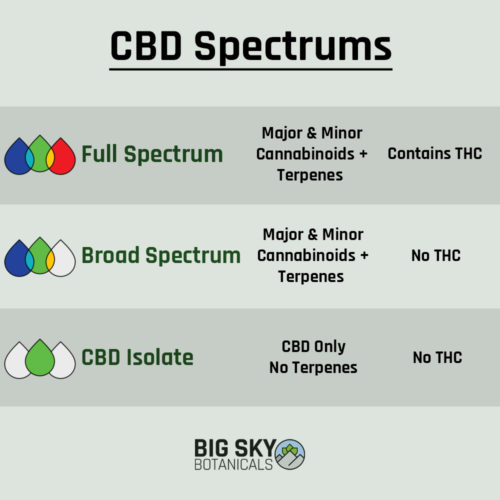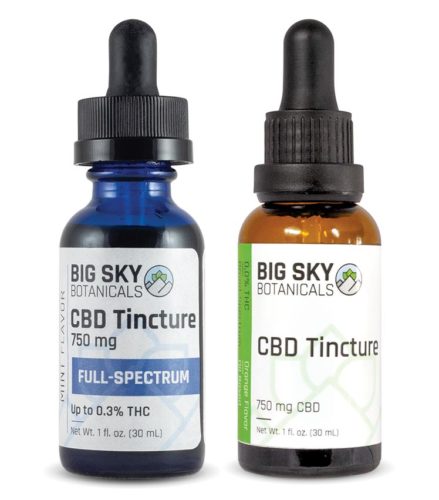 Shop
ShopBroad-Spectrum CBD Softgels
Broad-Spectrum CBD Oil Tincture
Full-Spectrum CBD Softgels
Full-Spectrum CBD Oil Tincture
CBD Gummies
CBD Balm
CBD Dog Treats
All Products >

When speaking with CBD users, it never ceases to surprise me how many people think that one product labeled 'CBD' is just the same as the next. For those of us familiar with the three main types of spectrums available - we know this simply isn't the case. If you fall into that first group, don't worry, we clear this all up below.
These different types of products contain different cannabis compounds which can have a major impact on the effectiveness and required dosage of a product. Without understanding product spectrums it's easy to get lost, or worse, buy the wrong product for your needs!
In this article, we are going to walk you through full-spectrum, broad-spectrum, and CBD isolate. Armed with the knowledge of what these spectrums are and how they differ, you'll be able to find high-quality, effective products that offer the maximum therapeutic potential for your needs.

Cannabidiol (CBD) is just one of many phytocannabinoids which are naturally found primarily in the flowering tops of the female cannabis plant. CBD and THC are the two most well-known cannabinoids that are sourced primarily from either hemp or marijuana.
Generally, marijuana is high in THC in order to produce the euphoric 'high'. Hemp is the other way around and is high in CBD and low in THC to stay within the legal boundaries set by federal hemp laws. Different strains of marijuana & hemp have different cannabinoid and terpene profiles. These strains are purpose-bred by cannabis growers depending on their application.
CBD-rich products can be sourced from high-THC marijuana, but they then must be sold through medical or recreational laws and regulations. Because of this, all CBD products available for public sale are sourced from hemp.
In order to capture and bottle these valuable cannabis compounds, an extract must be created. Across the hemp industry, the most common methods of extraction are either alcohol extraction via ethanol or supercritical CO2 extraction.
After extraction, the resulting oil undergoes some purification and activation processes. Depending on the processing done to the extract, one of the following spectrums are created. Learn more about how CBD oil is made in our article on the subject.


Full Spectrum is the term is used to describe an extract that contains a full range cannabinoid and terpene profile - including up to 0.3% THC. This profile provides the absolute highest level of entourage effectiveness. Assuming a high-quality extraction method was used properly, the cannabinoid and terpene contents and ratios will closely mirror that of the plant source.
When looking for a full-spectrum product, it's important to look for test results showing the percentages of each cannabinoid in the product. Reputable CBD companies will provide this information for all of their products.
Full Spectrum Lab Test Example:
You may scroll this table left and right to view the entire thing.
| Cannabinoid | ID | Weight %/g |
| Delta-9 Tetrahydrocannabinol | Δ9-THC | 0.20% |
| Tetrahydrocannabivarin | THCV | ND |
| Cannabidiol | CBD | 4.93% |
| Cannabidivarin | CBDV | 0.08% |
| Cannabigerol | CBG | 0.07% |
| Cannabichromene | CBC | 0.18% |
| Cannabinol | CBN | 0.02% |
| Tetrahydrocannabinolic Acid | THCa | ND |
| Cannabidiolic Acid | CBDa | ND |
| Cannabigerolic Acid | CBGa | ND |
ND = None Detected
It is important to note that full-spectrum oil will contain trace amounts of THC. As we discussed in the introduction hemp must adhere to the legal limit of no more than 0.3% THC by dry weight.
When an extract is created from hemp adhering to these limits, the THC content is usually 2-3%. The extractor then must dilute down the extract to bring the relative THC content back down. The final product must adhere to the 0.3% THC by weight legal limit.
At these low levels, these THC-containing products won't produce a 'high' when used at regular dosages. That said, this amount of THC can still be enough to cause the user to fail a drug test. This fact makes full-spectrum products a no-go for many. Luckily, there are two additional spectrums that address this problem head-on.

The newest spectrum on the block - broad-spectrum products contain a full spectrum cannabinoid and terpene profile with one exception - THC. These products offer maximum therapeutic potential without the need to consume THC. For people subject to drug testing or not wanting to consume THC for any other reason, broad-spectrum CBD oil offers the perfect solution.
Previously the only THC-free option on the market was CBD isolate, which we cover below. Broad-spectrum creation was enabled by advances in technology that allows extractors to filter out all THC using a special preparatory chromatography process. When shopping for 'true' broad-spectrum products, be sure that the product was created by removing THC from a full spectrum extract, not by distilling and adding additional cannabinoids and terpenes back together.
Here at Big Sky Botanicals, we specialize in broad-spectrum done right. Our broad-spectrum products are created via chromatography. The result is a cannabinoid and terpene-rich product designed for maximum effectiveness. For more information, see our process.
Broad Spectrum Lab Test Example:
You may scroll this table left and right to view the entire thing.
| Cannabinoid | ID | Weight %/g |
| Delta-9 Tetrahydrocannabinol | Δ9-THC | ND |
| Tetrahydrocannabivarin | THCV | ND |
| Cannabidiol | CBD | 4.93% |
| Cannabidivarin | CBDV | 0.08% |
| Cannabigerol | CBG | 0.07% |
| Cannabichromene | CBC | 0.18% |
| Cannabinol | CBN | 0.02% |
| Tetrahydrocannabinolic Acid | THCa | ND |
| Cannabidiolic Acid | CBDa | ND |
| Cannabigerolic Acid | CBGa | ND |
ND = None Detected

This final spectrum is the most straightforward. Isolate is simply the Cannabidiol isolated down to the single-molecule. The resulting product is a white powder, often found in very high (99%+) concentrations. This isolate may be added to a variety of carriers for human consumption or used as a standalone product in a variety of ways.
Isolate is often used as the CBD source in all kinds of products that look like full/broad-spectrum. This can be dangerous as isolates have been researched to require higher, more precise dosing for similar benefits when compared to the whole-plant approach that full/broad-spectrum offers.

When looking at a cannabinoid profile test, an isolate will register only for CBD and nothing else. Looking at an ingredients list, isolate-based products will contain 'crystalline CBD', not a hemp extract oil.
The naturally occurring terpenes are removed during the processing required to make an isolate. Because these terpenes are an important part of enabling the entourage effect, some companies will add terpenes back into an isolate to make a product commonly referred to as a terpsolate, once again this is not to be confused with broad-spectrum.
Isolate Lab Test Example:
You may scroll this table left and right to view the entire thing.
| Cannabinoid | ID | Weight %/g |
| Delta-9 Tetrahydrocannabinol | Δ9-THC | ND |
| Tetrahydrocannabivarin | THCV | ND |
| Cannabidiol | CBD | 99.11% |
| Cannabidivarin | CBDV | ND |
| Cannabigerol | CBG | ND |
| Cannabichromene | CBC | ND |
| Cannabinol | CBN | ND |
| Tetrahydrocannabinolic Acid | THCa | ND |
| Cannabidiolic Acid | CBDa | ND |
| Cannabigerolic Acid | CBGa | ND |
ND = None Detected

Today labeling can be confusing and many less-desirable brands are labeling their products deceptively. There are many cases where companies call a product 'full-spectrum' when it's actually just an isolate.
The only surefire way to know what is in your CBD product is to check for lab results. The best CBD brands online are providing not only product level but also batch level reports from 3rd party labs. You should look for these reports to ensure you know exactly what is in the CBD products that you're taking. If you can't find labs for the specific product you're purchasing, look elsewhere.
To help you through this process, we've written an article that guides you through reading and understanding cannabis lab reports you'll also find all of the lab reports for our products published here.
Groundbreaking research from Israel published in 2015 concluded that the synergistic effects of whole-plant cannabis are superior. The study concluded that full-spectrum CBD was more effective in the treatment of conditions in mice than single-molecule CBD isolate. This whole-plant approach is commonly referred to as the 'entourage effect'.
CBD isolate does not provide these additional and synergistic benefits due to the removal of all plant compounds except CBD during processing. Isolates have also been researched to need higher, more precise dosing than whole plant alternatives. Put simply, a whole-plant product provides a much wider range of therapeutic benefits than CBD isolate does.
This means that choosing a full or broad-spectrum product is the best choice. Choosing between the two really comes down to your preference for consuming THC or not.
For those who cannot consume THC, a broad-spectrum product is perfect. For those who can ingest THC really have the choice between full and broad spectrum and may choose to use both. The trace amounts of THC in a full-spectrum product can often have a sedative effect. This makes broad-spectrum a great option for taking during the day, with a full-spectrum product then being used in the evening to help promote a good night's rest.
It would be unfair to compare full and broad-spectrum products to CBD isolate without taking a look at both sides of the coin. While the therapeutic range of benefits is clear-cut, there are still viable uses for an isolate worth mentioning:
Some users may simply find an isolate to do the trick, and that is fantastic. We cover the various uses in our article on the vast applications of CBD isolate. Even for people who are satisfied with an isolate, we would still recommend giving a comparable broad-spectrum product a try - you might be surprised at what you find.
When an extract is created from hemp using a low-temperature method like supercritical CO2 extraction or cold pressing, the resulting products contain non-activated acid forms of the cannabinoids. A product containing just these cannabinoids is known as a raw spectrum product.
These 'non-activated' acid forms have different effects on the body than their 'activated' non-acid counterparts. For example, THCA is non-psychoactive while THC is. In order to convert the raw form to an active form, an extract must be decarboxylated. Through a heating process, the acid molecule is removed and you are left with the 'activated' non-acid form.
The common acid forms of cannabinoids found in CBD products include:
Though there is limited research available, there are some reports that point to these acid forms providing specific health benefits. Because of this, many users seek out blended products which include both the acid and non-acid forms of the cannabinoids. A raw extract is sometimes combined with a decarboxylated extract to create either blended full-spectrum products.

Here at Big Sky Botanicals, we provide a complete line of broad-spectrum and full-spectrum CBD oil products. You'll find everything from softgels, to tinctures, to balms. Head on over to the products section to see the entire product line.
Hi Rod, as you'll see in the chart, the heading reads weight % per gram. This means that for every gram of the tested compound, there was 4.93% CBD. The test can be performed on the extract itself, or on the end product (we do both for example). What this means is you'll need to know this information and do your own calculations. If you're out shopping for a product, it should be clearly labeled how much CBD is in each serving. You can see this in practice on all of our product pages.
Please confirm if I'm understanding my research correctly. The water soluble spray will be absorbed better than the oil tincture.
Thanks....Ann
Hey Ann, you are correct. A nanoemulsified water-soluble spray would be more bioavailable than a standard oil-carried tincture. Oil-based products used sublingually are more readily absorbed through the mucous membranes as opposed to swallowed oil-based products. Water-soluble products can help when used sublingually but really shine for products which are swallowed. They offer a much higher absorption rate when compared to an oil-based solution.
Hello thanks for the useful article, I’m developing some topical products and am only allowed to use isolate, I’ve been told that the benefits of full spectrum are wasted in topical products and that actually isolate is just as effective, is this correct please? (I do understand about terpenes, profiles, taking it sublingually etc) thank you
Hello Ellebee - thank you for this great question. This concept is something we discuss in our most recent article on topicals. The short answer is that full/broad-spectrum products should perform better. Cannabinoids beyond CBD and terpenes are frequently utilized in topical applications for added benefit. Limiting the cannabinoid/terpene profile down to only CBD would result in a less effective product.
Hello,
Thanks for the detailed article. Question, I understand that CBD isolate is in powder form in its final stage. For full spectrum cbd extract is it in oil form or is it also in powder form?
Hey Ed - great question. While most commonly you'll find full-spectrum extracts as an oil-based material, there are a select number of manufacturers out there providing full or broad-spectrum extracts in a powdered form.
Just to clarify, does that mean the full spectrum extracts are usually extracted in powder form that is then converted to oil form? The reason I ask is because I would like to make my own oil. Thank you so much for your response
It would be the other way around. First, the hemp plant is extracted into an oil, then into a powder. This is the same way an isolate is made. More info in this article that might be helpful for you: https://bigskybotanicals.com/blog/how-is-cbd-oil-made/
I thought a CBD extract becomes isolate through winterization resulting in powder? The article you provided says " In their purest form, these isolates are a crystalline white powder comprised of 99%+ cannabidiol." Sorry to ask so many questions, I am just trying to understand the science of all of this.
Hey Ed - winterization is used to remove unwanted material from an extract (fatty acids, plant materials, chlorophyll etc). An isolate is made through either chromatography or short path distillation. The article I linked above has the full breakdown near the bottom.
Hello,
I would like kindly to ask is cbd oil made from ethanol method is also full spectrum, isolate?
The definition "full spectrum" is the raw green-black paste after 1 step of extraction CO2 Or the full spectrum means alredy decarboxylated oil ? Is the raw oil, not dedecarboxylated has CBD or its unactive and it has just CBDA. How it looks?
Thanks in advance for your reply.
I`m looking forward to hearing from you soon.
The extraction method (ethanol as you mention) would be used to create a full spectrum extract. This extract is defined as full spectrum because it contains the full range of compounds found in the original hemp plant. Further processing is required to isolate only the CBD.
Is it possible to strip the thc off for broad spectrum without using ethanol?
Hello Patricia,
Please correct me if I am wrong, but the wording of your question seems to imply that ethanol is used in the process of removing THC from a hemp extract. This is actually not the case - let me explain: Ethanol is used in one of several types of extraction which pulls the oil extract from hemp - we cover extraction types here. The THC is removed independently of the extraction process via chromatography. Chromatography can be applied to an extract regardless of how it was made - IE our products are extracted using either CO2 or ethanol methods which both then undergo THC removal via chromatography. It may be helpful to visit the "our process" page which explains how our products are made step by step.
Hey Terri - purchasing products locally is often a tricky thing because most retailers don't provide lab reports for the products they sell. We provide a guide for reading lab reports here. Instead, I'd suggest purchasing online because you can carefully select a reputable brand and review their lab tests before purchasing. As an example, we provide our lab reports on each and every product page, as well as all together here.
Our products sounds like might be perfect for you since you're looking for a THC-free option, which all of our products are! As for any specifics to crohns, we can't speak to that, unfortunately.
If you do buy locally, I'd ask to see lab reports for the product you're looking to purchase, and if the retailer can't provide them, then be wary.
Let us know if you need any other help and best of luck!